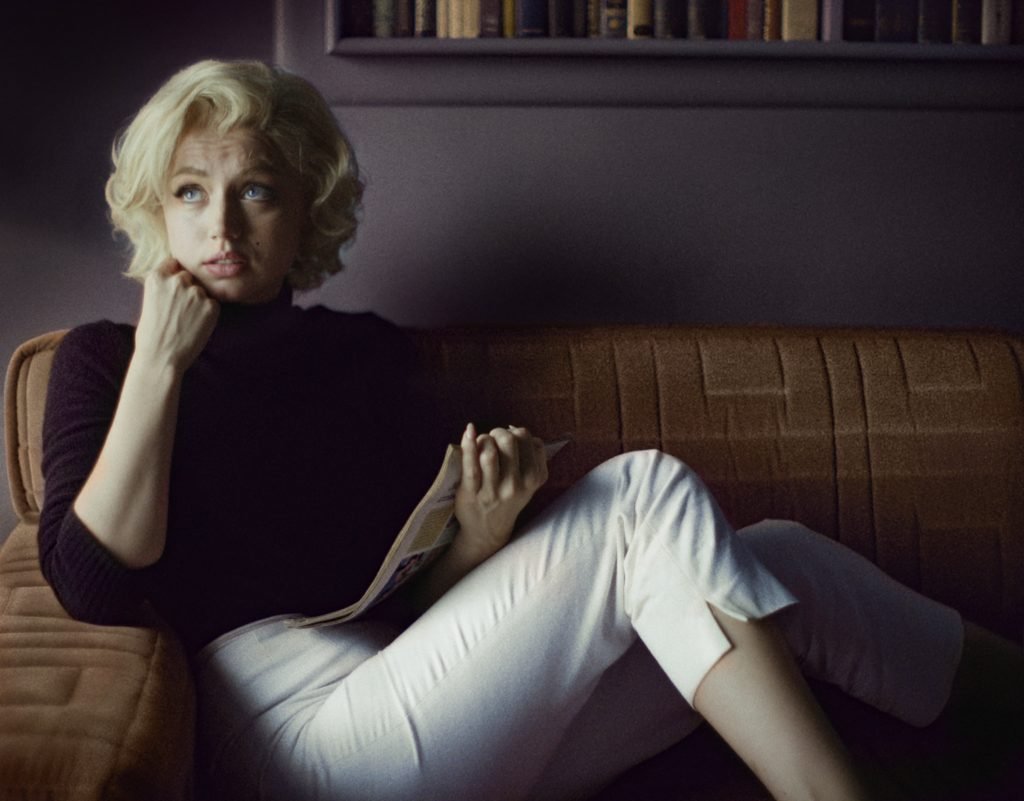Blonde has the same tried-and-true intention as any standard biopic: it wants to remind us why Marilyn Monroe’s all too brief life and career are worth remembering. But its experimental nature, owing to the equally experimental novel it’s based on, lends itself not to celebrating her achievements but rather indulging in her nightmares and travesties. And there were a lot of them. The star that was unwillingly conjured from the physique of Norma Jeane Mortenson may have shined brightest of all, but after a painfully unearned 166 minutes, the only truth that writer-director Andrew Dominik seems to reach is that her luminescence was not the result of anything she did on her own. It was simply because the rest of her world was dim and bleak by comparison. Bleak enough to take advantage of her for as long as it could but too dim to understand that no moving image can represent the woman she truly was.
That’s not the worst truth one can reach about a figure as tragic as Norma Jeane. However, it’s a truth that’s frustratingly simple and, to a great extent, already known. It’s a tragedy of the film’s own doing, then, that the convoluted path it takes to convey such a one-dimensional idea strips her and her bombshell alter ego of any semblance of identity. Blonde may rise above the paint-by-numbers, encyclopedic quality that a lesser biographical film would’ve unwittingly brought to a story rich with potential, but it’s nevertheless a film that feels entitled to the same kind of greatness the world granted to the woman it’s about. Even as it tells a middling, not to mention misguided, story in which things only ever happen to her.
Sure, Dominik has the right to remind the entertainment industry that its most remarkable talent was born on the back of some horrifying incidents that gave his film its controversial NC-17 rating, which it more than earns. Blonde certainly doesn’t glamorize any of the parental abuse, marital abuse, substance abuse, rape, and unplanned pregnancies that transpire over its lengthy runtime, but it gives us very little to dissect beneath such an unflinching exterior. Another work in Dominik’s small catalog, 2007’s The Assassination of Jesse James by the Coward Robert Ford, was itself a poetic meditation on the American landscape’s relationship to fame and one that also mourned the legendary figure at its forefront. The director is chomping at the bit to inform us that both a famous actress and an infamous outlaw can be far more than the terrible fates they were resigned to as long as the world remembers that they were people, too. It’s an honorable lesson, indeed, but what Dominik has lost in the 15-year gap separating the two films is a way to make his tragedies feel uniform and complete. In the case of Blonde, there’s a lot more that goes into humanizing a character than simply making them suffer.

Despite its free-wheeling creative license, there is a sense of factuality to the film’s presentation of Monroe’s (greatest) life hits, if only because the actress playing her is the one who seems most in touch with how severely Norma Jeane had collapsed in on herself towards the end of her life, what Ana de Armas accomplishes as the Hollywood starlet is nothing short of spectacular, as every bit as revelatory as one can expect from an up-and-coming actress. The latter has solidified her status as one of the film industry’s most promising talents. So in tune is de Armas with Monroe’s tumultuous way of life, which included an abusive, mentally ill mother (Julianne Nicholson); publicized marriages to both Joe DiMaggio (Bobby Cannavale) and Arthur Miller (Adrien Brody); and exchange of unwanted sexual favors with John F. Kennedy (Caspar Phillipson, whose resemblance to the President alone is worthy of future film appearances). De Armas is so in command of her craft as another actress who takes her chosen skill seriously that not even the momentary slippage of her Cuban-Spanish accent is enough to unground such a terrific turn.
The actress slips equally into Norma Jeane and Marilyn as if the two are multiple personalities that have been pitted against one another by a hostile industry and ignorant culture. A particularly telling scene in which Norma Jeane auditions for Don’t Bother to Knock is some of de Armas’ best work to date. She draws upon the unresolved trauma of her character’s scarred childhood, even when the cost of landing a role she desperately wants is to sacrifice such raw honesty so that Marilyn Monroe can be born. And that she is when the casting director and producers only have the time and patience to stare her down from head to toe. It’s that same tightrope walk de Armas later employs when Norma Jean resurfaces to offer genuine inspiration for one of Miller’s plays, with the untapped radiance of both actresses being enough to move Miller to tears.
Related Article:
Elvis (2022) Review: A Great Biopic That’s Both, A Hagiography And A Folktale
Memorable sequences such as these are unfortunately few and far between in a film that is hard to enjoy, even in the moments of technical brilliance when Dominik incorporates his lead actress directly into scenes from Monroe’s films. The images of de Armas performing “Diamonds Are a Girl’s Best Friend” or conversing with Tony Curtis is enthralling, to say the least. Still, they’re offset by the film’s frequent, at times seemingly random, shifts in color grading and aspect ratio, the latter of which serves no real purpose and merely adds to the grading sense of dissatisfaction one is likely to have by the time Blonde finally reaches its inevitable if not irresolute conclusion.
The film never goes so far as to misrepresent Norma Jeane and the tragedy of her downfall, which began about as swiftly as her life did, but it never gives us an idea of what her suffering was all in the name of if anything at all. It never fully decides on what it thinks Marilyn Monroe should be, a stance that, with more considerate execution, could’ve just as easily led to transcendence rather than squalor. Elton John and Bernie Taupin wrote in their hit song, “Candle in the Wind,” that Norma Jeane was someone who “never knew who to cling to,” and Blonde would have us believe something similar. But unlike the mournful musicians, the film’s belief in such a principle is rooted in its own inability to offer it’s subject a helping hand.
Blonde (2022) Recap
How Does Norma Jeane Grow Up?
Blonde opens on a seven-year-old Norma Jeane Mortenson (Lily Fisher) in 1933. She is raised by an alcoholic and mentally unstable mother, Gladys Pearl Baker Mortenson (Nicholson), just outside of Hollywood. Her mother frequently lashes out at her without notice. On Norma Jeane’s seventh birthday, Gladys gifts her daughter with a framed picture of a man she claims to be Norma Jeane’s father, informing her that he will return to the two of them eventually. Though she doesn’t refer to the man by name, claiming that she is forbidden to do so, she implies to Norma Jeane that he is a big-time producer in the Hollywood system. When Norma Jeane reaches her hand out to touch the picture, Gladys scolds her once more.
Sometime later, a wildfire breaks out and spreads to the Hollywood Hills. As the carnage progresses and dozens of cars flee the area, an intoxicated Gladys attempts to drive Norma Jeane into the Hills to see her father, who purportedly lives in the neighborhood. Their car is eventually stopped by the police, who order Gladys to turn the car around and take her daughter home. Later that night, when Norma Jeane asks about her father once more, Gladys forces her to take a scalding hot bath before attempting to drown her. Norma Jeane escapes to her neighbors, the Flynns (Sara Paxton and Ryan Vincent), who promises to keep her safe as Gladys continues to act out irrationally and berate her daughter. The Flynns eventually take Norma Jeane to an orphanage while Gladys is sent to a mental hospital, having been declared unfit to care for Norma Jeane any longer.
How Does Norma Jeane Become “Marilyn Monroe”?
By the late 1940s, Norma Jeane has become a modestly successful pin-up model using the stage name of “Marilyn Monroe,” having posed for several magazines, calendars, and catalogs. She is determined to make it big as an actress, but her first interview with film producer Darryl F. Zanuck (David Warshofsky) ends with her being raped by Zanuck. In exchange for the sexual favor, Zanuck lands Norma Jeane a variety of acting auditions, including one for Don’t Bother to Knock. Reading for the role of a mentally disturbed babysitter, Norma Jeane recalls memories of her childhood during the audition, causing her to break down in tears and leave. However, the casting director is impressed nonetheless, and she is thus awarded the role.
With her acting career finally gaining ground, Norma Jeane begins to seek comfort in Charles “Cass” Chaplin, Jr. (Xavier Samuel) and Edward “Eddy” G. Robinson, Jr. (Evan Williams), and the three engage in a polyamorous relationship. Though she feels she can be her true self around the two of them, Norma Jeane is instructed by her agents to break ties with Cass and Eddy after being spotted in public with them. She soon finds that she is pregnant with Cass’s child, which she finds delightful. However, she eventually chooses to have an abortion out of fear that her child will inherit the same mental health issues plaguing her mother. When she is scheduled to terminate the pregnancy, Norma Jeane tries to change her mind at the last moment, but she is too late. Distraught, she ends her relationship with Cass and Eddy.
Who Does Norma Jeane Marry?
In 1953, Norma Jeane meets retired baseball player Joe DiMaggio (Bobby Cannavale), and the two bonds over the pressures of fame and feeling lost within their chosen professions. Norma Jeane expresses to Joe her desire to be taken seriously as an actress, which she believes she can achieve by moving to New York and starting a career on Broadway; Joe expresses sympathy about her dream in return. As she finishes filming Gentlemen Prefer Blondes, Norma Jeane begins receiving letters from a man claiming to be her father. At the film’s premiere, she expresses dissatisfaction toward Zanuck about her performance, telling him that it does not reflect who she truly is. Later that night, she returns to her hotel room, having been told that someone is there waiting for her. Expecting the visitor to be her father, she is instead greeted by Joe, who proposes marriage to her, to which she hesitantly accepts.
By 1955, Norma Jeane and Joe find themselves in a loveless marriage, made all the more contentious once Cass and Eddy resurface, and provide Joe with nude publicity photos she had previously taken, some of which feature the two of them, as well. Joe is angered by this, so much so that he acts abusively toward Norma Jeane and demands that she not go through with filming The Seven Year Itch due to her character’s promiscuous appearance. She defies him, however, and goes through with the production anyway, which includes a famous publicity stunt in which she stands over a subway grate in a white dress. When the film wraps up, a drunk Joe becomes even more violent towards Norma Jeane and beats her. The two divorced shortly thereafter.
Not long after the divorce, Norma Jeane travels to New York and auditions for Arthur Miller’s newest play, Magda. Her first read-through goes very well, though Arthur is the only one who appears to be unimpressed. The two eventually meet one-on-one to discuss her character in-depth, and Norma Jeane can provide Arthur with some insightful pointers on how she interprets the character. Arthur is moved to tears and won over by Norma Jeane, officially accepting her for the role. The two marry sometime later and move to Maine, living a quiet but happy life as they become pregnant. However, as the two are walking along the beach one day with a tray full of food, Norma Jeane trips accidentally and tragically miscarries. Norma Jeane remains distraught for quite some time but eventually returns to acting to cope with the grief.
Why Does Norma Jeane Take Pills?
By 1959, as Norma Jeane is wrapping up filming on Some Like it Hot, her grief has carried over into uncontrollable fits of rage and mental breakdowns. Hounded by the constant bombardment of the press and the feeling that she has lost her sense of self, she frequently lashes out on set, with director Billy Wilder receiving the brunt of her outbursts. She has also become gradually distant from Arthur, and to relieve herself of the stress, she begins consuming pills.
In 1962, Norma Jeane, now heavily reliant on prescription drugs and alcohol, was taken by Secret Service agents to meet President John F. Kennedy. While Kennedy is on the phone in his hotel bed discussing his history of inappropriate sexual encounters with one of his representatives, he forces Norma Jeane to perform oral sex on him before hanging up the phone and raping her. He then takes her away after she throws up in his bed during the encounter.
Blonde (2022) Ending Explained
How Does Norma Jeane Die?
Becoming increasingly hallucinatory and strung out, Norma Jeane begins to question if becoming “Marilyn Monroe” was truly worth it, considering everything she has gone through. She then hallucinates having another abortion before being sent back to her home in Los Angeles. A short time later, she receives a call from Eddy, who explains to her that Cass had passed away from a pulmonary embolism, but not before he left a parting package for her. Norma Jeane is reluctant to see what Cass has left her at first, though Eddy convinces her to see it before sending it to her in the mail.
When Norma Jeane opens the package, she finds a stuffed plush tiger that she recalls from her past, having lost it when she left her mother to be taken to the orphanage and found again during her time with Cass and Eddy. Inside the package, she also finds a brief letter from Cass, in which he explains that all of the letters from her father were actually written by him. He could see that she was longful for the presence of her father in her life and wrote letters to assuage her loss. Heartbroken by this revelation, Norma Jeane overdoses on barbiturates. As she retires to her bed to die, she has a vision of her father embracing her and welcoming her to the afterlife.


![Alita: Battle Angel [2019] Review: Defeated by It’s own Plot](https://79468c92.delivery.rocketcdn.me/wp-content/uploads/2019/02/alita-battle-angel-movie-2019-high-on-films.jpg)
![Shin Ultraman [2022]: ‘NYAFF’ Review – More like an episodic love letter to Ultraman by fans than a cohesive movie](https://79468c92.delivery.rocketcdn.me/wp-content/uploads/2022/07/SHIN-ULTRAMAN-MOVIE-REVIEW-3-768x512.jpg)
![Winter Boy [2022] ‘TIFF’ Review: An Affecting And Personal Meditation On Loss & Grief](https://79468c92.delivery.rocketcdn.me/wp-content/uploads/2022/09/Winter-boy-2022-review-768x384.jpg)


